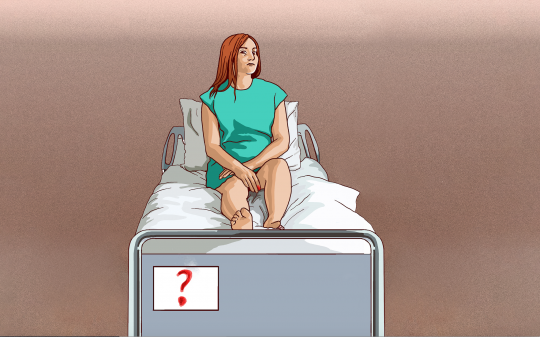This is the blood that hospitals don’t like

I haven’t heard anyone point out that menstrual poverty applies to female patients in psychiatric hospitals.
DR SEBASTIAN KOTERWA: I didn’t call it that, because I came across that term a year or two years ago at the most. Then this phenomenon began to be named more and more broadly in Poland, and I realised that I had been encountering menstrual poverty for many years, since the beginning of my work with women.
KATARZYNA BIEŃKOWSKA: Even being so close, working with women, talking to them, I didn’t realise the problem for a long time. Then one day a patient came to me and shyly asked if I had any sanitary pads. I asked her if there were any menstrual hygiene products in the ward. She said she had been to the nurse before, and she spread her hands and offered the patient lignin.
Lignin!
BIEŃKOWSKA: It shocked me then, too, that in the 21st century, when menstrual hygiene products are relatively cheap and readily available, a situation arises where a woman, with shame and shyness, asks another woman for a sanitary pad. And in the ward she hears that she can get lignin or cotton wool. I know that in extreme cases patients have used paper towels.
It's not being talked about out loud.
DR KOTERWA: This is an unwanted topic, an open secret. Menstruation was never discussed at hospitals. And especially not with doctors. We are not the ones on the front line. This problem is more often discussed with women – nurses, psychologists.
BIEŃKOWSKA: It is true that it is easier to talk about menstruation with a woman. Especially when, as in my encounters with patients, we are in a one-on-one situation. It’s conducive to confidences. And from the visit of this patient who had no pads, I began to pay special attention to the problem.
What was the result of these observations?
BIEŃKOWSKA: That the problem is bigger than I thought. That patient’s situation was such that she had no one to deliver any packages to her at the hospital. And she just didn’t have money to buy herself something in the hospital shop. It is particularly difficult in the pandemic because patients’ exits from the ward are restricted, visits are stopped. The scary thing is that many patients simply cannot afford the cheapest sanitary pads. Many patients – due to their chronic illness – live off pensions and do not have supportive families. When they are taken to hospital, sometimes they are in the middle of a psychotic episode, they don’t think about packing, getting ready, taking money. Thus, the problem affects not only the poorest, but also well-off patients. If they go to hospital unprepared and there is no one to provide them with money or hygiene products, they also experience menstrual poverty.
Should the doctor discuss this with the patient?
DR KOTERWA: Of course your doctor should know about problems with access to menstrual hygiene products. After all, we are responsible for our patients’ mental well-being. And ensuring proper hygiene during period affects a woman’s mental well-being. Furthermore, certain medications that are used to treat mental disorders can disrupt the menstrual cycle. If you avoid talking about your period, you don’t know if you need to change your medication.
Is the topic avoided?
DR KOTERWA: In Poland, we are all soaked in the same stereotypes. Patients don’t talk about it freely. Especially with doctors. But it’s often our fault that they don’t feel comfortable. We often give up for a simple reason – inexplicable shame, stereotypes that we pass on from generation to generation. A doctor, especially, should not be guided by such stereotypes. Therefore, it is necessary to show that it is a physiological thing. And menstrual poverty is a phenomenon that should not exist.
Everything happens behind hospital walls. On the outside, it’s easy for us to pretend the problem doesn’t exist.
DR KOTERWA: Patients are excluded from this discourse, which makes them all the more affected. They are excluded because menstruation in general is something we don’t talk about. It seems ugly to us, problematic, not easy. Especially for men, I admit. And it shouldn’t be like that. Just because we don’t talk about something doesn’t mean the problem disappears. Mental illness is another thing that many people find uncomfortable, ugly, it’s best to forget about it. Therefore, female patients in psychiatric hospitals are a doubly stigmatised group.
BIEŃKOWSKA: Imagine the situation where nappies were suddenly no longer reimbursed for hospital patients. And yet it’s a similar category. Why isn’t there a reimbursement for sanitary pads for female hospital patients? Once again we come to a situation where a woman has to manage somehow. After all, it’s physiology that affects half the population, and we still allow women to be embarrassed or ashamed because of their physiology.
Does this happen at hospitals?
BIEŃKOWSKA: Of course. More than once, I have heard of situations where a patient who did not feel properly protected during her period gave up participating in social life, did not go to therapy, and preferred to stay in bed so that ‘something doesn’t happen to her’ because she doesn’t know if the lignin will work or not.
DR KOTERWA: There are times when some of us doctors and nurses can be stigmatising. Matters of physiology or bloodstained bedding are sometimes discussed in public, during rounds.
Such experiences violate women's dignity.
DR KOTERWA: This is a clear violation of dignity. Just asking for a pad and hearing that they are unavailable can be humiliating. These are women in crisis. I meet them every day, work with them, and look at them probably differently than those who don’t know the subject. Among the patients there are those with an exacerbation of mental illness, on the other hand – those who have a hard time in life, lowered mood, suicidal thoughts, but do not have a mental illness. Psychiatric patients are not people who are out of touch with the real world. Yes, sometimes some of them in acute psychotic states do not pay attention to their superficiality or hygiene. But no matter how severe the patient’s condition is, that doesn’t mean they don’t feel the emotion of having their dignity violated. They deserve the same respect and support as all other patients, as all women. We have no right to take it away.
BIEŃKOWSKA: Often in interviews during my therapeutic work I hear very sad reflections from patients. ‘Where have I come to, at what point in my life am I that I can’t even buy myself sanitary pads?’, they ask. They say the disease took away their dignity and that they thought it couldn’t get any worse. And it actually did. Subjectivity is very important. The belief that the patient is sick, not worse, affects the entire healing process.
Who helps patients experiencing menstrual poverty?
BIEŃKOWSKA: When I realised the problem, I felt a sense of female solidarity. I told my friends about my discovery and we decided to stock the ward with hygiene supplies. Each month one of us stocked up on pads and tampons. Once, when I was walking through the hospital hallway with a large bag, one of the resident doctors asked what I was carrying. I told her about menstrual poverty in the ward. She shook her head. And she joined the action. Now we are working with the Okresowa Koalicja [Period Coalition], an organisation to address menstrual poverty and exclusion. Thanks to this collaboration, free menstrual hygiene products were provided in the hospital ward. There are more and more such boxes appearing in the public space. This makes it easier for many women.
DR KOTERWA: This needs to be talked about as much as possible. And that’s why I’m talking to you about it today. Menstrual poverty is not just a lack of sanitary pads. It’s also a shame that no woman should have to experience, a violation of dignity that we’ve talked about.
Is it also a lack of awareness of your own physiology?
BIEŃKOWSKA: What we see at hospitals is the tip of the iceberg. Underneath is the patient’s past, the lack of conversation about menstruation at home, where women’s issues were a taboo realm. This too is menstrual poverty. And I find that I’m talking to a patient who is unaware that irregular periods can be indicative of poor medication choices or health problems. I ask further and I hear that the woman does not feel that she should go to the gynaecologist regularly and take care of her own health. That’s why I habitually talk to patients about physiology. I ask about gynaecological prophylaxis. And I am convinced that such education is very much needed. Together with a group of people from the Medical University of Warsaw we are doing a large project on gynaecological prophylaxis. We want to gather information in psychiatric wards across the country about patients’ awareness of their own health. We want to find out what percentage of patients regularly check their health.
Again, it turns out that menstrual poverty is much more than just a lack of sanitary pads.
BIEŃKOWSKA: This issue affects women on many levels. And it shows paradoxes. Because a woman who ends up at hospital – no matter what condition she’s dealing with – doesn’t stop being a woman. And we treat her like she isn’t one. And as if she’s to blame for the fact that she’s menstruating, so she’s causing trouble. Unthinkable? This is how we behave, after all. You need to speak out about it. Systemic changes and reimbursement of menstrual supplies are needed. Because we’ll be stuck in beautiful, renovated hospitals where a woman gets a wad of lignin from a nurse during her period.
Katarzyna Bieńkowska, psychologist and psychotherapist in training, with experience in working in a general psychiatric ward
Sebastian Koterwa, MD, resident in psychiatry, Drewnica Masovian Regional Hospital, 2nd Psychiatric Clinic of the Medical University of Warsaw
Author: Agnieszka Urazińska
Ilustracja: Marta Frej
The text was published in „Wysokie Obcasy” a magazine of „Gazeta Wyborcza”
on 18 December 2021


